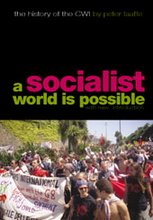US ‘empire’ in crisis Pt 1
The US is the world’s only superpower yet, despite its overwhelming military might, in relation to Iraq, Afghanistan and now Somalia it has become embroiled in situations that it cannot control. Peter Taaffe examines the perspectives for US imperialism.
The United States is the strongest power the world has ever seen.
Peter Taaffe, General Secretary, Socialist Party, England and Wales
It has an army of more than one and a quarter million men and women, with half a million soldiers, spies, technicians, teachers, dependants and civilian contractors deployed in other nations. It also has just under a dozen carrier task forces in all the oceans and seas of the world and, through its doctrine of ‘full military spectrum’, intends to dominate space as well.
This new Rome – called an ‘empire of bases’ by the perceptive US commentator Chalmers Johnson – has 725 officially recognised bases throughout the world; unofficially there are at least 1,700 of these military institutions. Its arms expenditure, bloated enormously since 9/11, is equal almost to the total spending of the rest of the world put together.
The new Rome
Following the attack on the World Trade Centre in 2001, US imperialism sought to unilaterally deploy this force to establish a ‘unipolar world’, in which its power remained unchallenged.
Indeed, one commentator proclaimed that “there was hardly a single prominent figure [in the US] who found fault with the notion of the United States remaining the sole military superpower until the end of time”. Even before 9/11, another asserted: “America is no mere international citizen. It is the dominant power in the world, more dominant than any since Rome. Accordingly, America is in the position to reshape norms, alter expectations and create new realities. How? By unapologetic and implacable demonstrations of will.”
Al-Qa’ida’s attack on the US gave Bush precisely the excuse to realise this dream of the ‘neo-conservative’ cabal that surrounded him from his first day in office. The first target was Afghanistan, then Iraq, to be followed by the bringing to heel of Iran and the subjugation of the whole of the Middle East. This was part of the ‘grand plan’ of transforming the United States’ ‘informal empire’ into an open ‘New Rome’.
It took centuries for the Roman Empire to collapse, yet in less than a decade Bush’s imperial presidency is disintegrating in the sands of Iraq, the mountains of Afghanistan and the chaos of Somalia. The reasons for the record headlong retreat of US imperialism were anticipated by the Socialist Party and the Committee for a Workers’ International. We argued that the use of overwhelming military power alone could not succeed. It would conjure up a massive national and social revolt that would rebound within the borders of the US itself, resulting in what capitalist commentators themselves call ‘blowback’.
Opposition
The effects of this are seen in the unprecedented slump in Bush’s ratings – standing at 31% in May. He is the most unpopular president since 1945 apart from the hated Nixon, who was driven from office as a result of the Vietnam War and its repercussions in Watergate.
There is no foreseeable end to the horrors of Iraq. The horrible massacre at Haditha inevitably conjures up the similar atrocities of the Vietnam War, symbolised by the massacre of over 500 men, women and children at My Lai. The difference this time is that the revelations of Haditha have come out much more quickly than those of My Lai.
Also, American opposition to the Iraq war is now greater than it was at the time of the Vietnam atrocities, with six out of ten Americans already believing that the 2003 invasion of Iraq was a ‘mistake’. This has compelled normally hawkish senators such as John Murtha to demand a speedy withdrawal of the US from Iraq. However, it is one thing to go into a quagmire but much more difficult to extract oneself from it.
The Independent commented on the bayoneting and shooting of women and children at Haditha: “Clearly, with every passing day, the war that Iraq resembles is Vietnam.”








